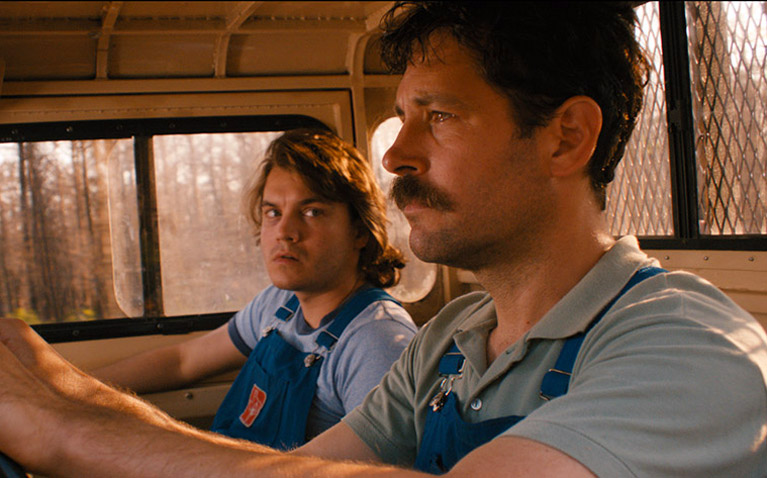
It’s the summer of 1988 and a violent wildfire has swept through Texas, destroying 43,000 acres and some 16,000 homes. In the wake of this horrific devastation—a freak of nature that no experts can explain—two highway road crew workers spend the season in isolation, painting and repairing the roads that lay alongside these ravaged forests. Disciplined to a fault, Alvin (Paul Rudd) is perhaps too tightly wound for his own good and has a myopic idea of what a man should be. The boss of this operation, he loves the solitude the job affords him, and being away from the nearby (unnamed) big city. His girlfriend however, isn’t entirely sold on the idea. Lance (Emile Hirsch), his partner and polar opposite, is a hopeless, emotionally immature dumbass. He lives for the weekend, getting wasted and getting laid. In fact, the only reason he has this job is because he’s the brother of Madison, Alvin’s girlfriend.
Curiously moving, remarkably funny and refreshing, while featuring a wonderfully oddball tone that’s minor key and sublime, “Prince Avalanche” is a major comeback for filmmaker David Gordon Green, whose eclectic career has traversed beguiling indies (“George Washington“) and left-of-center mainstream comedies (“The Sitter,” “Pineapple Express“). But the film may not be the exemplary return to form that pundits might be expecting or wanting. It’s far from a retreat to the safe comfort of his generally more-beloved indie films and instead, it’s an exciting step forward, a progressive blend of his career thus far. Also sweet and very humanistic in its strange little way, “Prince Avalanche” is an affecting meditation on men, relationships, nature and rebirth that might be Green’s most vital film to date.

Mostly a two-hander, ‘Avalanche’ moves quietly, at its own subtle pace. Rudd and Hirsch have chemistry to spare and the film chronicles these men as they argue, fight and swap stories about their estranged lady friend relationships, and though they butt heads often, over time they begin to bond and understand each other on a deeper level. Slightly tyrannical, Alvin always goes off on how surprised he is at how Lance doesn’t know how to perform adult, manly tasks like gutting a fish, cooking, building a campfire, etc. He prides himself on his work ethic, and the fact that he’s providing for his girlfriend who has a child, by sending her money. But he also never sees her, and that’s a palpable strain he’s dealing with. Lance, on the other hand, is an insecure dope, and his concerns are mostly about chicks, money and clothes, but his misguided insights provide for a lot of the film’s biggest laughs.
Also briefly featuring TV and film character actor Lance LeGault as a local truck driver, every time the old man appears on screen he steals every scene with hilarious Texas wisdom. He chats with them about life, girls, heartache and relationships, gives them some kind of toxic moonshine libation, and like a crazy old banshee he’s off again, appearing out of nowhere here and there throughout the film. In a strikingly sad and touching sequence, Alvin comes across the film’s only other character; an unnamed eldery lady (Joyce Payne), sifting through the ashes of her devastated home and life. She appears briefly and quickly like an apparition and there’s certainly a unaccountably ghostly quality to her later on. When Lance goes off to the city to get laid on the weekend, instead of going home to see his girl, Alvin wanders around, going through the burned down houses of others, pretending he’s home and talking to a wife that doesn’t exist.

Based on the little-seen Icelandic film “Either Way,” which this writer hasn’t seen, judging from the trailers and clips online, David Gordon Green’s effort looks remarkably similar in story and tone. But presumably the director found his own way (and said he aimed for as much in the post-screening Q&A). And to its refreshing credit, “Prince Avalanche” is a unique and unusual little film. It can be hysterical, but also muted and sometimes even deeply and unexpectedly profound. The picture is also accentuated by the wistful and sonorously beautiful and beatific music of frequent Green music collaborator David Wingo and rock band Explosions In The Sky, the score unlike what you’d expect from a post-rock band that usually features anthemic and burning guitar crescendos. Stylistically, Green creates some wonderfully stunning and evocative visual sequences, which nicely complement the tone of the piece. Featuring the cinematography of Tim Orr, these scenes are vibrant and speak to the heart and soul of the film in creatively unexpected ways.
Contemplative, playfully loose and exploratory (but nothing like mumblecore, to which some have lazily drawn comparisons), “Prince Avalanche” is a distinctly singular David Gordon Green film which feels like the logical next-phase direction for the filmmaker. He delicately finds the sadness in beauty, the loveliness in destruction, the comical in the unpredictable moment, often to seriously funny and thoughtful effect. Green’s work has always been about finding the patience to discover these wonderful moments in life and “Prince Avalanche” is a tour de force in that sense. A wonderfully eccentric examination of unlikely friendships that illuminates the absurd and lovely corners of life, “Prince Avalanche” is a deeply enjoyable, wondrous delight that you should give yourself over to when it eventually hits theaters. [A-]
This is a reprint of our review from the 2013 Sundance Film Festival.

